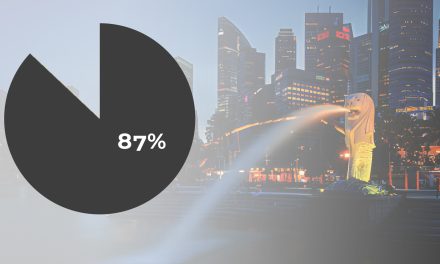Out-of-home advertising has seen a shift with brands across APAC rapidly adopting and spending on pDOOH, which is leading to tremendous growth, both in the region and globally. Here are 6 reasons why.
Programmatic digital out-of-home (DOOH), or pDOOH, is the automated process of buying and selling DOOH ad placements. This enables brands to target locations where an audience naturally moves throughout their day, capturing the right kind of attention while building successful customer engagement.

Recently, OOH advertising has seen a shift with brands across APAC rapidly adopting and spending on pDOOH, which is leading to tremendous growth, both in the region and globally. The catalyst for this growth has been advances in technology, positioning pDOOH as a must-have in any media mix. Technology has enabled six key benefits that brands in APAC should leverage across their campaigns.
-
1. Enhanced targeting
Through pDOOH, advertisers, brands, and marketers can leverage data to ensure they are delivering highly targeted messages to their desired audience, not just at the right place but at the right time. This precision ultimately drives engagement and conversion. The evolution of DOOH targeting capabilities includes behavioral targeting, allowing brands to build audiences based on the locations they visit, first- and third-party data integrations and targeting, as well as device ID passback to re-engage consumers through retargeting.
The combination of these advanced targeting techniques helps advertisers better understand consumer behavior, allowing them to accurately tailor their message. This is a powerful development in the world of OOH, and not only maximizes the impact of pDOOH campaigns but also reinforces the importance of a data-driven strategy across the multicultural advertising landscape in APAC.
-
2. Higher brand exposure
To truly make a splash, pDOOH provides one-of-a-kind, high-impact advertising formats that capture attention both near and far. Brands can also take advantage of these larger-than-life formats to display compelling video and other data-informed assets like countdowns, distance to store, and more.
What many don’t recognize is that brands can amplify their branding and grow awareness by strategically activating screens in contextually relevant environments throughout their audience’s day. Place-based screens such as those in office buildings, shopping malls, and residential buildings, for example, ensure consumers are repeatedly exposed to messaging at key touchpoints that influence their purchasing decisions. This could be as simple as a local restaurant promoting their lunch specials between the hours of 10 am and 1 pm in local office buildings or at a nearby MRT station.
-
3. Fast activations
Gone are the days when OOH campaigns would take weeks, if not months, to activate. Today, pDOOH allows brands to launch their campaigns at the click of a button. By utilizing a DOOH demand-side platform (DSP), advertisers gain the ability to effortlessly upload, schedule, and launch campaigns within minutes. Whether a campaign aligns with the latest social trends, there’s additional budget for a spontaneous push, or a need to respond promptly to breaking news, pDOOH provides the flexibility and efficiency required to meet the demands of real-time marketing.
-
4. Real-time optimization
Due to the ever-changing market in APAC, it is important that brands can seamlessly update their campaigns to deliver the right message and creative that will resonate most with their audience. Through the use of data, pDOOH gives brands the ability to optimize their campaigns in real-time to improve results and drive greater ROI. They can even do this across different regions. For example, if a campaign is very effective in one place but struggling in another, brands can optimize as they go, giving themselves the best chance of success.
-
5. Increased Creative Flexibility
A key and standout feature of pDOOH is its creative flexibility. In contrast to traditional static billboards, pDOOH harnesses dynamic content capabilities that allow for real-time updates and changes across creative.
Moreso, ads can be scheduled to run during specific times of the day and days of the week. This adds a new layer of precision to the campaign while minimizing wastage and increasing value as the ads only run when needed. This flexibility ensures that messages are always relevant and timely, providing brands with the agility to align content with their own priorities and what matters most to their audience.
-
6. Evidence-based measurement
The evolution of pDOOH has addressed the lack of measurement options seen in traditional media. Leveraging programmatic technology, advertisers gain access to precise and transparent data analytics, providing invaluable insights into the performance of their campaigns. This comprehensive approach allows for the measurement of various key performance indicators (KPIs) such as impressions, brand lift, and foot traffic. This helps marketers and brands tangibly demonstrate the value of pDOOH to key stakeholders, positioning it as a must-have channel in their media mix.
In APAC, with one of the most diverse markets in the world and a vast amount of brands fighting for consumer attention, pDOOH is set to play a huge role in helping brands connect with their audiences. In 2024, advertisers who utilize the spate of benefits that come with pDOOH are setting themselves up for success in the physical world.



















